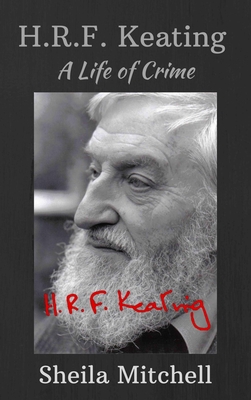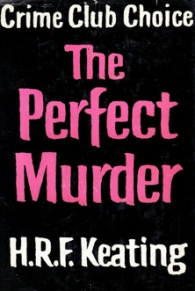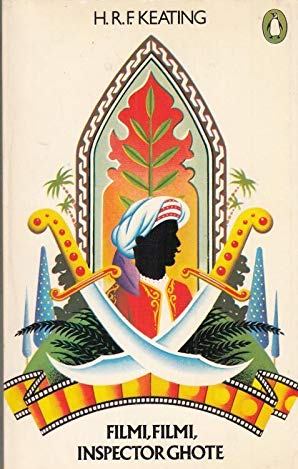
From: Trilokya Jena
Many a time the perception of outsiders about a place, its people and its politics is much deeper than native insiders. I had one more proof of it when I stumbled upon the fictional Bombay Police Inspector Ganesh Ghote, the blundering hero of HRF Keating’s crime novels set in the city of Bombay as it was known then. It was more engrossing as I happened to be posted in Bombay those days and used to walk its mean streets every now and then true to my nature. I came to know of the fictional Inspector Ghote only when I read a news item of Stellan Skarsgaard’s ( the fairly well known Swedish actor) visit to the city in connection with shooting of a film temptingly titled The Perfect Murder based on the crime novel by HRF Keating(1926-2011).
I got curious when I came to know that Keating’s detective is Inspector Ghote of Bombay Police who has been his protagonist in a series of novels. Though an avid reader of detective novels from childhood and having graduated in that genre from my native Odiya detective stories to English/American through Hindi and Bengali detective novels(thanks to AH Wheeler and those numerous train journeys), I had grown slightly high brow in the genre going past Conan Doyle, Edgar Allen Poe and Agatha Christie onto some serious literature in the genre embracing Dashiell Hammett’s Sam Spade and Raymond Chandler’s Philip Marlowe, detectives who took crime investigation to metaphysical levels. I was surprised to have missed our own Inspector Ghote on the international crime fiction scene as I had somehow never heard of HRF Keating. In those pre Google days one had to go to a library and I promptly went to the British Council where I was amazed to find a whole lot of books by Keating featuring Ghote on the covers and I came to know that Perfect Murder has been his first novel set in Bombay to feature Ghote.

I must say that I not only enjoyed the writing style of Keating and his characterisation of of the Bombay Police Inspector, both as a person and a policeman, I also liked the film which I saw afterwards and was very impressed by the performance of Naseeruddin Shah, Amjad Khan and Ratna Pathak as Mrs Ghote who together completely pushed Skarsgaard to the side. Little did I anticipate then that one day I would have to invoke Keating and his Inspector Ghote in a real life situation involving a crime in the city that would shake crime investigation and criminal justice system of the country to the core.
Normally crime writers create detectives from their own countries who mostly investigate their domestic crimes. Occasionally some detectives travel abroad to investigate crimes in foreign countries as Poirot of Agatha Christie and, more recently, Harry Hole of famous contemporary Norwegian crime writer Jo Nesbo. But they essentially belong to the writer’s home country. It’s a tribute to Bombay and its police force that Keating chose his detective from and set his entire crime series on the city. His Inspector Ghote was created as a typical native Indian character, under paid and fed, not demonstratedly smart and articulate, not outwardly efficient but effective, virtuous and good natured, possessing old world values, overall as endearing an Indian as you’d ever find. Though lacking any distinct sense of humour his ultimate delivery on the task in his characteristic clumsy way contains sufficient humour in itself. This is so reminiscent of Bombay Police in vintage Bollywood films where every Constable is a Pandu and every Inspector is a Shinde! For much of our youth, these policemen delivered on their job with the ubiquitous dialogue at the end ‘aap kanoon apne hath nahin le sakte’.

Back to Inspector Ghote. HRF Keating had the insight into the power structure and socio political equation of Bombay to create a series of narration starting with The Perfect Murder(1964) to touch upon every aspect of the city life. Of particular relevance for today is his novel ‘Filmi Filmi Inspector Ghote’, a 1976 crime story set on the quintessential Bombay world of Bollywood where Ghote is called upon to delve into the dazzling, chaotic world of Bollywood movies to solve the murder mystery of the most famous screen villain Dhartiraj. This novel sees Inspector Ghote take on the Bombay film industry, as he is called out to the Talkiestan Studios to investigate the murder of the film star Dhartiraj, who has been crushed on set by a 5ton light, whose ropes have been severed. Inspector Ghote may take his family to the cinema every now and then, but he is not very well informed on the world of films.
Aside from his lack of film knowledge, Ghote also has to contend with unhelpful witnesses such as Seth Chagon Lal, the producer who threatens the inspector to not interfere with his production and is not at all impressed by Ghote’s firm belief in following the letter of the law. Moreover, proving anyone was at the scene of the crime at the right time is a significant obstacle in Inspector Ghote’s case, although as the case progresses, he does manage to find several motives for killing Dhartiraj, a man initially everyone says was universally loved. Was the killer a rival actor who is tired of being kept in the lime light? Or perhaps the murderer is not a rival over professional reasons, but in matters of love? Maybe the person responsible is a chamcha of Dhartiraj who is finally tired of waiting for their chance to shine on set? Inspector Ghote has many false leads and red herrings to sort out before finally reaching the truth, not only spurred on by justice, but also by the intoxicating power of Nilima, a legendary actress, who sets Inspector’s Ghote’s heart racing. But with so many big names involved and a lack of support from his Deputy Commissioner, will this case be the undoing of Inspector Ghote?

A key process which occurs in the novel is within the character of Inspector Ghote himself. He enters the case firmly believing in his duty as means towards justice and upholding the letter of the law. But very quickly the inspector becomes infected by the possibility of the fame and rewards he could receive for finding the killer and Ghote begins to see his role as a detective in a more film star light, perceiving himself as a star actor and even the courtroom as a film set: ‘It was still less than twenty-four hours since the crime had been committed. To have solved the mystery in that time. It would be a star performance. A true star performance.’ It takes most of the book for Inspector Ghote to lose this delusion and by the end of the novel, when the killer has been discovered and Ghote realises what he could have lost, he acts with sensitivity and sees that ‘a quiet end to it all’ was for the best and ‘was a fitting end to it for him too’.
Keating’s affiliation with India was curious. It got personified in a middle-aged Marathi policeman, stationed in Bombay, a God-fearing father of two called Inspector Ghote, briskly solving murder mysteries in an exotic variety of locales, from a large -run-down mansion- in the mofussil to the ritziest of Bombay’s film studios. When Ghote made an appearance in a small whodunit called The Perfect Murder, a one-shot try by a struggling crime novelist in London trying to break into the competitive American book market, both Keating and the city of Bombay made it to the crime detection history. Keating embraced the city on the pages of his book, a city and its country he’d never visited, had no particular interest in and relied on geography books to trace where Bombay exactly was. But he was aware of Bombay Police’s legendary reputation of efficiency. That alone made him take the gamble to set his stories in the city whose Police carried its own legend.
That legend has been slipping for quite a while and now it lies on stretcher after the Supreme Court’s verdict in the SSR case everyone knows about. It would not be necessary here to go into the much analysed possibilities of the SSR case nuances. I am more concerned about the demise of a police force’s reputation and credibility which was already crumbling when I left the city in the mid 1990s. There are no more Ghotes in that force, none of that shy and self-questioning sleuth more benignly disposed toward humankind than the Sam Spades or Philip Marlowes of the world. The Ghotes of the force, those detectives especially tough or especially insightful in the ways of the criminal mind but possessed of unassailable integrity, and those stick-to-it guys who just can’t be put off the case have departed along with Keating. Now you’ve the trigger happy, scheming, ambitious, Dubai minded, Ab Tak Chhapans who have taken the force to its tatters. Keating laid himself down in 2011, his dream force might have taken a little under a decade to follow him.
(Jena, the former principal chief commissioner of Income Tax, had a long time posting in Mumbai)






